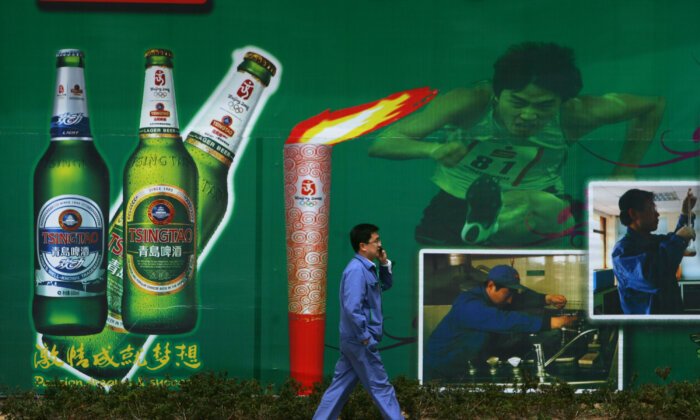Tsingtao Beer ‘Hygiene Concern’ Stirs Concerns over Chinese Food Safety in South Korea
Despite reassurances that the beer was not for export market, South Korean consumer skepticism remains.
A Chinese video on social media has escalated into a hot topic of debate not only among Chinese netizens but also in South Korea, causing considerable public outrage. Numerous South Korean consumers of a popular Chinese beer have vowed to never purchase it again.
On Oct. 19, a video surfaced on various Chinese social media platforms, including Douyin (the Chinese version of TikTok) and Weibo, showing an employee scaling a fence to gain unauthorized entry into a malt storage facility at Tsingtao Brewery’s third plant. Once inside, the individual proceeded to urinate in one of its tanks. This video rapidly gained traction, becoming one of the top trending topics on Weibo and earning the name “The Tsingtao Beer Urination Scandal” on various Chinese media outlets.
In response, Tsingtao Brewery Co. issued an official statement on Oct. 20, acknowledging the incident that was captured on video at their third production facility the preceding day. The company announced that the matter had been reported to public security authorities, who have since begun an investigation. Meanwhile, the malt batch affected in the video has been quarantined.
The incident has prompted widespread skepticism among Chinese consumers, with many questioning the integrity of Tsingtao Beer—a brand with a 120-year legacy and a leading position in China’s beer market. The third plant, implicated in this controversy, boasts an annual production capacity of 1.2 million kiloliters (about 317 million gallons) and is hailed as “Asia’s largest and most efficient world-class smart factory.”
The ripple effects of the incident have reached South Korea, a significant market for Tsingtao Beer. Despite reassurances from the South Korean import agent for Tsingtao that the beer meant for domestic and export markets is produced in separate facilities, consumer skepticism remains.
Seo Kyoung-duk, a South Korean social activist and professor at Sungshin Women’s University, said that this is not an isolated incident but a broader issue concerning food safety in China. He referred to past controversies, like the one involving a Chinese individual pickling cabbage in unhygienic conditions, which had ignited similar outrage in South Korea. The professor urged the South Korean government to heighten scrutiny of imported Chinese food products, citing public health concerns.
- NC Democrat Jackson Announces Candidacy for Attorney General Amid Redistricting by Republicans
- Maine’s Massacre Reflects National Failure in Addressing Violence Among the Mentally Ill





